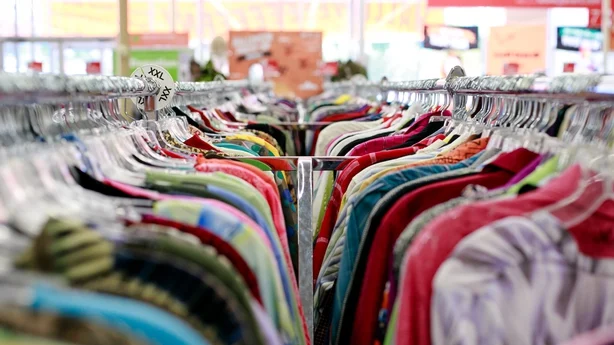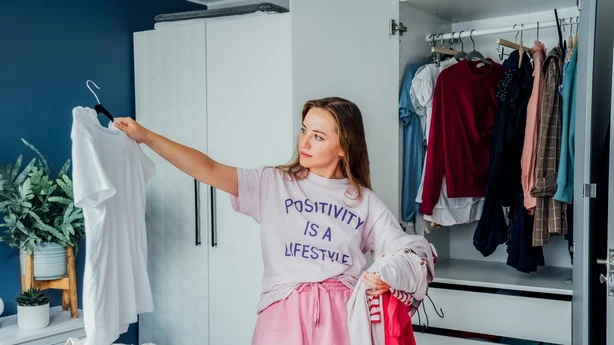Part of the thrill of second hand shopping, alongside the financial necessity, is checking the label to assess the quality, but while twirling the racks of the local charity shop, labels from super fast fashion brands are dime a dozen.
As clothing that is not made to last starts clogging up our means of access to second hand clothing, it highlights a problem in our attitudes that goes beyond the environmental and social determinants of fast fashion.
We can't undo the damage that has been done by bringing another fast fashion item into existence. Once we have bought them, it's up to us to ensure they have some form of continuity and are not just destined for the landfill. So what are we supposed to do with the items we no longer want?

Resale or donation are some of the best ways to bring a garment into a cyclical life cycle, but as hyper fast fashion is generally of low quality and realistically not going to survive as a functional, hard-wearing item for more than a few months, listing them online for potentially new owners can be a hard sell. This has led to reselling sites like Depop and Vinted hosting an incredible amount of fast-fashion pieces.
We don't have Vinted in Ireland, but sustainable stylist Victoria Lee, based in Glasgow, began tracking the amount of fast fashion items being listed on the platform, and noticed a trend: the amount of items was growing and growing.
"I noticed a massive increase in fast fashion pieces on resale sites early last year and I couldn't believe the numbers I was seeing," said the award winning stylist, who posts her findings to her TikTok under the handle @thesustainablestylistuk. "I am in charity shops a lot so I had already seen the slow trickle of these brands coming into charity shops but to see the actual numbers within the resale apps genuinely shocked me to my core."
She says she does updates on the amount of fast fashion items listed every six months, "and the growth rate of these numbers are shocking".

Depop has a similar issue, albeit on a smaller scale - Vinted has 65 million registered users to Depop's 35 million. A quick search on Depop coughs up 920,291 items from Zara, 399,786 items tagged as Shein clothing, 405,023 as ASOS and 500,646 from H&M at the time of publication.
With an estimated 15% of clothing getting reused or resold, the reality of fast fashion purchasing is far greater than these reselling numbers.
There can be a perception that reselling is a wholly sustainable act, but unless we are also engaging in conscious consumption behaviour alongside it, it's not the anti-fast fashion coup we think it is.
Reselling is a great option, and helps extend the lifespan of existing clothing and keeps them out of landfill, but we also need to be minimising our consumption to lessen the demand and as a result, lower the rate of production and encourage companies to take on better practices.
Despite an emphasis on sustainability and an increased consumer appetite for sustainable options we are still consuming fast fashion at a rapid rate. The draw of trends (and microtrends pedaled on social media) is strong, with shoppers wanting to be shod in the most current styles. It is slowing down this process of consumption that should be the priority, regardless of where we are shopping.
The negative impacts of the fast fashion industry are well known at this stage. Victoria, who has been working within a completely sustainable model for four years, explains that, "fast fashion is fueling a lot of resale platforms, people will use the excuse of 'I'll sell it after I wear it' to justify the purchase. At the end of the day, the platform will still receive the fees no matter what brand of clothing is sold.

The solution is a simple one in theory: taking a more old-fashioned approach to clothing that our grannies would be proud of. Only purchase clothing with the intention of keeping them in use for as long as possible, through practices such as repair and reuse, and support designers and brands, where possible, who design with this in mind.
Conscious consumption is not an easy, automatic switch, as we are so primed now to getting a buzz from affordable fashion shopping and socially primed to want to take part in new trends. Victoria advises trying to make the most of the fast fashion we already have rather than trying to expunge it onto someone else through selling.
"I always encourage people to firstly try a restyle: if you've fallen out of love with something, try and style it a completely different way. Use Pinterest for inspiration or just have a play around in your wardrobe trying it with different things," she recommends.

"If you really don't want the item anymore, ask a friend or family member if they'd be up for a clothing swap, that way you get something from them too without spending a penny or buying into fast fashion! Or you could upcycle it into something you would wear. Ultimately, we need to make better choices from the get go, get to know your personal style, don't buy into trends, buy secondhand or from a sustainable brand where you can!"
That said, it would be counterproductive to avoid buying second hand fast fashion. France has recently voted to consider a surcharge on super fast fashion items to make them less attractive to buyers, and there are calls for Ireland to follow suit. A tax like this is sure to slow down consumption, but the fast fashion that exists in our wardrobes already has got to go somewhere once we are finished with them.
Why recycle it or risk it becoming textile waste when someone else could get wear from it? It's a complex issue with many prospective solutions, but like many things when it comes to sustainability, making conscious choices over impulsive purchases is the foundation for solving our fast-fashion problem.
Disclaimer: The copyright of this article belongs to the original author. Reposting this article is solely for the purpose of information dissemination and does not constitute any investment advice. If there is any infringement, please contact us immediately. We will make corrections or deletions as necessary. Thank you.






